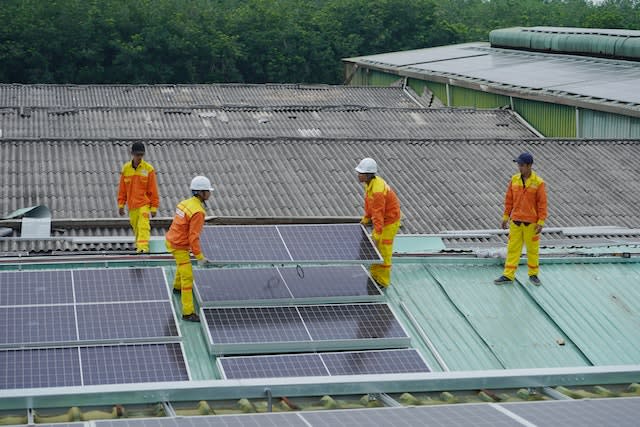Digital twins will help realise Malaysia’s sustainability dream

Malaysia, a rapidly advancing nation in Southeast Asia, is at the forefront of economic growth and increasing energy demands.
Recognising the critical role of energy efficiency in achieving sustainability goals, reducing greenhouse gas emissions, and ensuring a reliable energy supply, the Malaysian government is eager to explore innovative solutions.
One powerful solution is the integration of digital twins to enhance energy monitoring and visualisation across diverse sectors. Key applications include:
i. Real-time monitoring and visualisation
Malaysia’s robust manufacturing sector can greatly benefit from digital twins by enabling real-time monitoring and optimisation of energy usage. This is crucial for improving energy efficiency in manufacturing processes, cutting operational costs, and reducing carbon emissions. In buildings and infrastructure, applying digital twins to smart buildings and urban projects can revolutionise energy consumption management, leading to lower electricity bills, improved environmental impact, and enhanced energy efficiency.
Digital twins in manufacturing create virtual replicas of physical systems for continuous monitoring and analysis of energy consumption patterns. Real-time data helps identify inefficiencies, optimise processes, and make informed decisions, contributing to cost savings and aligning with global sustainability goals.
In buildings and infrastructure, digital twins offer a comprehensive understanding of energy usage. Real-time monitoring identifies energy-intensive areas, enabling timely interventions for optimised consumption. This results in reduced electricity bills for consumers, promoting energy conservation at an individual level, and supporting Malaysia’s commitment to sustainable development.
ii. Simulation and scenario analysis
Malaysia’s ongoing energy infrastructure development, particularly in renewable sources like solar and wind, can benefit from digital twins for simulation and scenario analysis. Modelling various scenarios helps evaluate the optimal integration of renewable energy into the grid. Digital twins play a crucial role in predicting the impact of intermittent energy sources, optimising energy storage solutions, and contributing to sustainable urban planning, especially in rapidly growing cities like Kuala Lumpur.
Integrating renewable energy sources poses challenges due to their intermittent nature. Digital twins provide a platform for simulating different scenarios, allowing stakeholders to assess the impact of renewable energy integration on the energy grid. This includes predicting variations in energy output, understanding potential bottlenecks, and optimising energy storage solutions for a reliable and resilient energy infrastructure.
In urban planning, especially in rapidly growing areas like Kuala Lumpur, digital twins offer a comprehensive toolset. They optimise transportation systems, reduce energy consumption in public infrastructure, and enhance overall urban sustainability.
By simulating various urban development scenarios, decision-makers can make informed choices that prioritise energy efficiency, reduce environmental impact, and create more liveable and sustainable urban spaces.
iii. Predictive maintenance
In vital sectors like Malaysia’s oil and gas and power generation industries, digital twins revolutionise predictive maintenance. In the oil and gas sector, these digital replicas predict equipment failures, optimise maintenance for offshore rigs, and reduce unplanned downtime. Similarly, in power generation, predictive maintenance proactively identifies potential issues, ensuring more reliable and efficient energy production.
The oil and gas industry, a key player in Malaysia’s economy, grapples with equipment reliability and maintenance challenges. Digital twins enable predictive maintenance by continuously monitoring equipment conditions, predicting failures, reducing costly unplanned downtime, and optimising maintenance schedules efficiently.
In power generation, whether conventional or renewable, continuous and reliable operation is paramount. Digital twins facilitate predictive maintenance by analysing real-time data from power plants, allowing operators to identify issues, strategically schedule maintenance, and contribute to a more reliable and efficient energy production process.
iv. Energy consumption forecasting
Accurate energy consumption forecasting is critical for effective energy planning in Malaysia. Digital twins provide a solution for grid management, predicting energy demand and facilitating more efficient energy supply management. Energy consumption forecasts inform government decisions on energy policy, infrastructure investments, and energy conservation initiatives.
In grid management, digital twins offer a dynamic platform for forecasting energy demand by analysing historical data, current consumption patterns, and external factors. This capability helps the national grid operator manage energy supply efficiently, avoid peak demand issues, and ensure a stable and resilient energy grid.
Energy consumption forecasts also play a vital role in shaping energy policy and guiding infrastructure investments. The Malaysian government can use digital twins to make informed decisions about energy infrastructure expansion, renewable energy integration, and energy conservation initiatives. This data-driven approach ensures policies align with the evolving energy landscape, fostering sustainability and resilience.
As Malaysia progresses towards energy efficiency and environmental friendliness, the integration of digital twins stands as a beacon of innovation. Malaysia’s commitment to leveraging advanced technologies for sustainable development positions it globally, as a forward-thinking, and environmentally-conscious player. The synergy between digital twins and Malaysia’s vision for a greener future is set to yield tangible benefits, both economically and in building a more sustainable and resilient energy landscape.
Professor Ts. Dr Manjit Singh Sidhu is a Professor at the College of Computing and Informatics, Universiti Tenaga Nasional, Fellow of the British Computer Society, Chartered IT Professional, Fellow of the Malaysian Scientific Association, Senior with the Institute of Electrical and Electronics Engineers, and a professional technologist with the Malaysia Board of Technologists.
The post Digital twins will help realise Malaysia’s sustainability dream appeared first on Twentytwo13.


